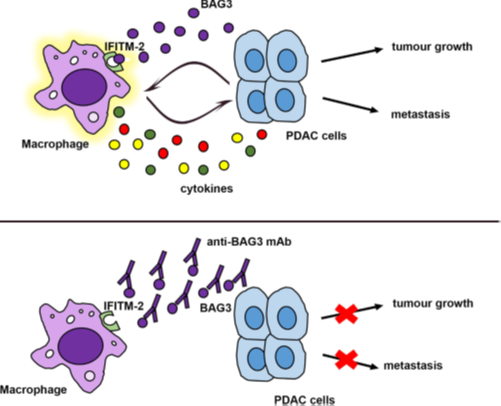-Bag3 biology in Pancreatic Cancer (PDAC) (Group Leader: Prof V. De Laurenzi)
Within the Cellular and Molecular Biochemistry Lab headed by Prof. Vincenzo De Laurenzi, we currently explore the cross-talk between pancreatic cancer cells and the surrounding microenvironment. In particular we are interested in the secretion of BAG3, an antiapoptotic protein, that is constitutively expressed in several primary tumors or tumor cell lines. We have previously shown that PDAC cell lines secrete BAG3. Secreted BAG3 can bind to a specific receptor, IFITM2, expressed on macrophages, and induce the release of factors that sustain tumor growth and the metastatic process. Furthermore we reported that the use of an anti-BAG3 antibody results in reduced tumor growth and prevents metastasis formation in different mouse models. On this way we are investigating other feasible targets of BAG3 in the tumor microenvironment such as cancer-associated fibroblasts (CAFs) and how these cells promote tumor advance.

Fig. 1. BAG3- mediated paracrine loop involving pancreatic cancer cells and microenvironment macrophages. PDAC-released BAG3 binds to its receptor, IFITM-2, onmacrophages and induces the secretion of factors, that in turn sustain tumour growth and the metastatic process. The interruption of this loop by an anti-BAG3 monoclonalantibody impairs tumour cell proliferation, tumour growth and metastasis formation.